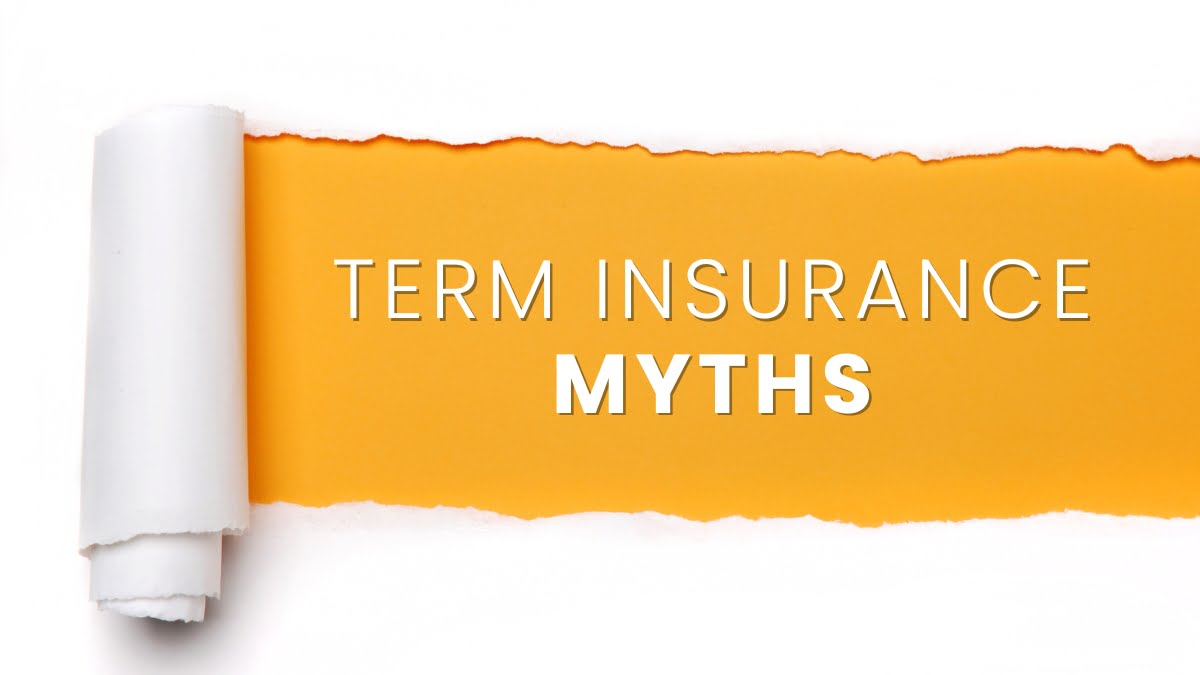Introduction
Term insurance is a straightforward and affordable way to ensure financial security for your loved ones. However, several myths and misconceptions can cloud understanding and decision-making. This blog aims to debunk common myths about term insurance, providing clarity and encouraging informed choices.

Myth 1: Term Insurance is a Waste of Money if You Outlive The Term
One of the most prevalent myths is that term insurance is a waste of money if you outlive the policy term. While it’s true that no benefits are paid out if the policyholder survives the term, the primary purpose of term insurance is to provide financial protection during crucial periods, such as raising children or paying off a mortgage. The peace of mind and security it offers during these times are invaluable. Additionally, some term policies offer a return of premium option, where you can receive the premiums paid if you outlive the term.
Myth 2: All Term Insurance Policies are the Same
Another common misconception is that all it policies are identical. In reality, there are various types of term insurance, each with unique features. For instance, level it maintains the same death benefit throughout the policy period, while decreasing it reduces the death benefit over time, often aligning with a mortgage balance. Return of premium term insurance refunds your premiums if you outlive the term, and convertible term insurance allows you to convert to a permanent policy without a medical exam. Understanding these differences is crucial for selecting the right policy.
Myth 3: Young and Healthy Individuals Don’t Need It
Some believe that young and healthy individuals don’t need it. However, purchasing insurance at a young age can lock in lower premiums, making it a cost-effective way to secure substantial coverage. Life is unpredictable, and having term insurance can provide a financial safety net for unexpected events, such as a sudden illness or accident. Additionally, young families or those with significant financial obligations can benefit greatly from the security insurance provides.
Myth 4: It is Only for Families with Children
While it’s true that term insurance is essential for families with children, it’s also beneficial for anyone with financial dependents or obligations. Single individuals with debts, such as student loans or a mortgage, can use insurance to ensure these are paid off in the event of their death. Business owners may also need insurance to protect their business and cover any financial responsibilities. Essentially, term insurance can be a valuable tool for anyone seeking to protect their financial legacy.
Myth 5: Buying It Online is Risky
Many people worry that purchasing it online is risky. In reality, buying insurance online can be a secure and convenient way to compare policies and find the best rates. Reputable insurance companies offer comprehensive online services, including detailed policy information, online applications, and customer support. Online platforms often provide tools to help you calculate coverage needs and compare multiple policies, making it easier to find the right fit for your situation. Ensure you are using a trustworthy site and check for customer reviews and ratings before making a purchase.
Myth 6: It Does Not Offer Enough Coverage
There is a belief that it does not provide sufficient coverage because it lacks an investment component. However, the primary purpose of insurance is to offer substantial death benefits at an affordable cost. It is designed to cover specific financial needs during a set period, such as income replacement, debt repayment, and education costs. For those seeking additional benefits, riders can be added to term policies to enhance coverage, such as critical illness or accidental death riders.
Myth 7: It’s Difficult to Make a Claim on Term Insurance
Some people think that it is challenging to make a claim on it, fearing that insurers will find ways to deny payouts. While it’s important to choose a reputable insurer with a high claim settlement ratio, the claim process for term insurance is generally straightforward. Beneficiaries need to submit a claim form along with necessary documentation, such as a death certificate. Reputable insurance companies promptly and efficiently honor valid claims.
Myth 8: It is Not Needed After a Certain Age
There is a misconception that term insurance is unnecessary after a certain age, such as retirement. However, the need for coverage depends on individual circumstances. For instance, if you have outstanding debts, a dependent spouse, or want to leave a financial legacy, term insurance can still be valuable.
Conclusion
Debunking these common myths and misconceptions about it is crucial for making informed decisions about your financial protection. Understanding the true benefits and features of it can help you recognize its value and choose the right policy for your needs. Whether you are young or old, single or with dependents, it offers a versatile and affordable solution for securing your financial future.
For those considering term insurance, it’s essential to research thoroughly, compare different policies, and consult with insurance advisors if needed. Empower yourself with accurate knowledge to make the best choice for your financial well-being.


